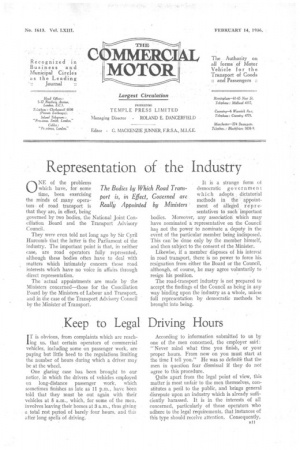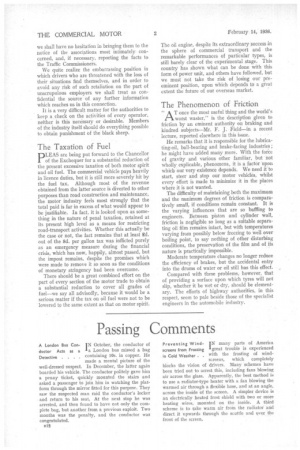Keep to Legal Driving Hours
Page 21

Page 22

If you've noticed an error in this article please click here to report it so we can fix it.
is obvious, from complaints which are reachling us, that certain operators of commercial vehicles, including some on passenger work, are paying but little heed to the regulations limiting the number of hours during which a driver may be at the wheel.
One glaring case has been brought to our notice, in which the drivers of vehicles employed on long-distance passenger work, which sometimes finishes as late as 11 p.m., have been told that they must be out again with their vehicles at 5 a.m., which, for some of the men, involves leaving their homes at 3 a.m., thus giving a . total rest period of barely four hours, and this _ after long spells of driving. According to information submitted to us by one of the men concerned, the employer said: "Never mind what time you finish, or your proper hours. From now on you inust start at the time I tell you." Ile was so definite that the men in question fear dismissal if they do not agree to this procedure. Quite apart from the legal point of view, this matter is most unfair to the men themselves, constitutes a peril to the public, and brings general disrepute upon. an industry which is already sufficiently harassed. It is in the interests of all concerned, particularly of those operators who adhere to the legal requirements, that instances of this type should receive attention. Consequently, we shall have no hesitation in bringing them to the notice of the associations most intimately concerned, and, if necessary, reporting the facts to the Traffic Commissioners.
We quite realize the embarrassing position in which drivers who are threatened with the loss of their situations find themselves, and in order to avoid any risk of such retaliation on the part of unscrupulous employers we shall treat as confidential the source of any further information which reaches us in this connection.
It is a very difficult matter for the authorities to keep a check on the activities of every operator, neither is this necessary or desirable. Members of the industry itself should do everything possible to obtain punishment of the black sheep.
The Taxation of Fuel
pLEAS are being put forward to the Chancellor of the Exchequer for a substantial reduction of the present excessive taxation of both motor spirit and oil fuel. The commercial vehicle pays heavily in licence duties, but it is still more severely hit by the fuel tax. Although most of the revenue obtained from the latter source is diverted to other purposes than road construction and maintenance, the motor industry feels most strongly that the total paid is far in excess of what would appear to be justifiable. In fact, it is looked upon as something in the nature of penal taxation, retained at its present high level as a means for restricting road-transport activities. Whether this actually be the case or not, the fact remains that at least Ed. out of the 8d. per gallon tax was inflicted purely as an emergency measure during the financial crisis, which has now, happily, almost passed, but the impost remains, despite the promises which were made to remove it so soon as the conditions of monetary stringency had been overcome.
There should be a great combined effort on the part of every section of the motor trade to obtain a substantial reduction to cover all grades of fuel—we say all advisedly, because it would be a serious matter if the tax on oil fuel were not to be lowered to the same extent as that on motor spirit. The oil engine, despite its extraordinary success in the sphere of commercial transport and the remarkable performances of particular types, is still barely clear of the experimental stage. This country has shown what can be done with this form of power unit, and others have followed, but we must not take the risk of losing our preeminent position, upon which depends to a great extent the future of our overseas market.
The Phenomenon of Friction
" A T once the most useful thing and the world's worst waster," is the description given to friction by an eminent authority on braking and kindred subjects—Mr. F. J. Field—in a recent lecture, reported elsewhere in this issue.
He remarks that it is responsible for the lubricating-oil, ball-bearing and brake-facing industries ; he might have added many more. With the force of gravity and various other familiar, but not wholly explicable, phenomena, it is a factor upon which our very existence depends. We need it to start, steer and stop our motor vehicles, whilst every effort is made to minimize it in the places where it is not wanted.
The difficulty of maintaining both the maximum and the minimum degrees of friction is comparatively small, if conditions remain constant. It is the varying influences that are so baffling to engineers. Between piston and cylinder wall, friction is negligible so long as a suitable separating oil film remains intact, but with temperatures varying from possibly below freezing to well over boiling point, to say nothing of other disturbing conditions, the preservation of the film and of its nature is practically impossible.
Moderate temperature changes no longer reduce the efficiency of brakes, but the accidental entry into the drums of water or oil still has this effect.
Compared with these problems, however, that of providing a surface upon which tyres will not slip, whether it be wet or dry, should be elementary. The efforts of highway authorities, in this respect, seem to pale beside those of the specialist engineers in the automobile industry.




















































































